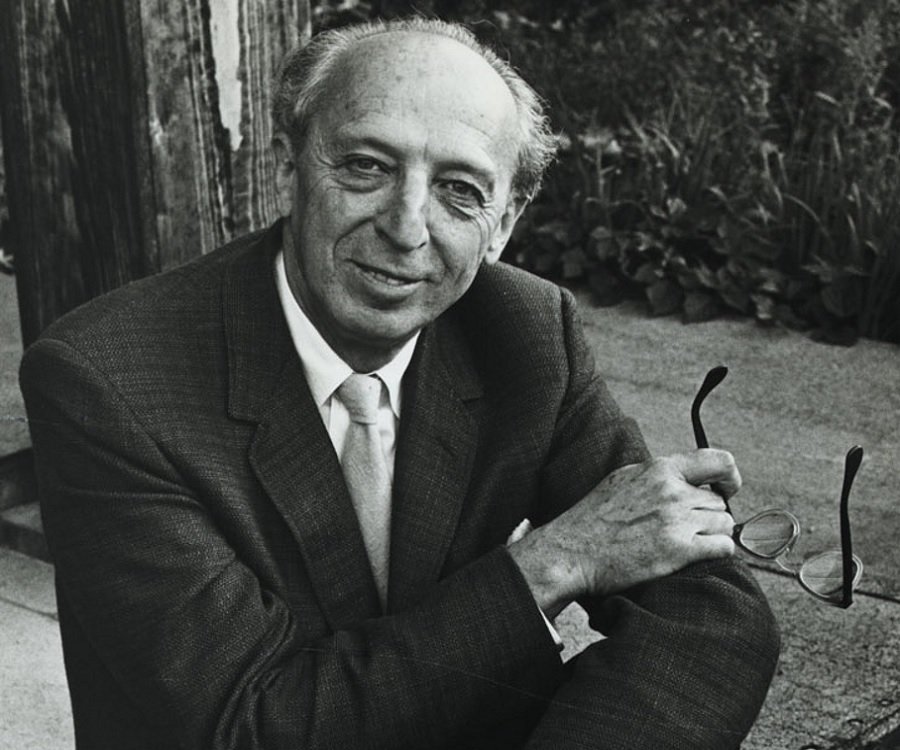(单词翻译:单击)
听力文本
I'm Steve Ember. And I'm Barbara Klein with People in America in VOA Special English. Today we tell about Aaron Copland, one of America's best modern music composers. Aaron Copland wrote many kinds of music. He wrote music for the orchestra, piano, and voice. He wrote music for plays, movies and dance. Copland also was a conductor, pianist, speaker, teacher and author. Music critics say Copland taught Americans about themselves through his music. He used parts of many old traditional American folk songs in his work. He was influenced to do this after studying music in France. He said that composers there had a very French way of writing music. He said Americans had nothing like that in this country. So he decided to compose music that was truly American.
Aaron Copland was born in nineteen hundred in Brooklyn, New York. He was the youngest of five children. His parents had come to the United States from eastern Europe. They owned a store in Brooklyn. Aaron began playing the piano when he was a young child. He wrote his first song for his mother when he was eight years old. His dreams of becoming a composer began when he was young. When he was sixteen, he urged his parents to let him study composing with Rubin Goldmark. Goldmark had taught the composer George Gershwin. When he was in his early twenties, Copland went to Paris where he studied music with Nadia Boulanger. She was one of the most important music teachers of the time. He returned to New York in nineteen twenty-four. The famous conductor of the Boston Symphony Orchestra, Serge Koussevitzky, learned about Copland's music.
Koussevitzky led the orchestra for the first performance of Copland's early work, "Music for the Theater," in nineteen twenty-five. Koussevitzky also conducted Copland's "Concerto for Piano and Orchestra" in nineteen twenty-seven. This work was unusual because Copland used ideas from jazz music in his concerto. Copland later wrote the music for two ballets about the American West. One was about the life of a famous gunfighter called Billy the Kid. Copland used music from American cowboy songs in this work. This piece from "Billy the Kid: Ballet Suite" is called "Street in a Frontier Town."

In nineteen forty-two, the conductor Andre Kostelanetz asked Copland to write music about a great American, Abraham Lincoln. Copland wrote "Lincoln Portrait" to honor America's sixteenth president. Copland's music included parts of American folk songs and songs popular during the American Civil War. He added words from President Lincoln's speeches and letters. "Lincoln Portrait" has been performed many times in America. Many famous people have done the speaking part. Eleanor Roosevelt, the wife of President Franklin Roosevelt, was one of them. Here, actor James Earl Jones performs in Copland's "Lincoln Portrait." Also in nineteen forty-two, the music director of the Cincinnati Symphony Orchestra asked eighteen composers to write music expressing love for America. For the competition, Copland composed "Fanfare for the Common Man." This music is played in America during many national events, including some presidential inaugurations. Experts say "Fanfare for the Common Man" was an example of Copland's change in direction during the nineteen forties.
He began writing music that was more easily understood and more popular. Copland wrote about this in nineteen forty-one in his book, "Our New Music." He wrote that a whole new public for music had developed as a result of the popularity of the radio and record player. He said that there was no reason to continue writing music as if these devices did not exist. So he decided to write music in a simpler way. Copland spread his ideas about music in other ways. He taught at the New School for Social Research in New York City and at Harvard University in Cambridge, Massachusetts. One of the many awards he received was the Pulitzer Prize. He won it in nineteen forty-five for his famous music for a ballet called "Appalachian Spring." It is one of his most popular works. The last part of the ballet is based on a traditional song, "A Gift to be Simple." Copland also wrote music for several major motion pictures. He won an Academy Award in nineteen fifty for composing the music for the film, "The Heiress." Then, he began experimenting with what is called a twelve-tone system of composing. His music no longer was as easy to understand, or as popular.
Copland stopped composing at the end of the nineteen sixties. Yet he continued to be active as a conductor and speaker. In nineteen eighty-two, Queens College of the City University of New York established the Aaron Copland School of Music. Copland was a strong supporter of liberal ideas. In the early nineteen- fifties, he and other famous writers, actors and intellectuals were accused of supporting communism. Public opinion changed, though. In nineteen sixty-four, President Lyndon Johnson presented him with the Presidential Medal of Freedom. It is America's highest award to civilians. Aaron Copland died in nineteen ninety at the age of ninety. But his music lives on.
重点解析
1.conductor (交响乐、合唱的) 指挥
The conductor brought home the full thrust of the work's emotional resolution.
指挥将该作品情感上的毅然决然这一主旨充分表现了出来。
2.be influenced to do 受影响
You do not seem to be influenced by the environment.
你好象并不受环境影响。
3.perform 演奏
Gardiner has pursued relentlessly high standards in performing classical music.
加德纳在演奏古典音乐方面始终不懈地追求高标准。
4.express 表达
He expressed grave concern at American attitudes.
他对美国的态度表达了严肃关注。
5.the popularity of ......的流行
Because of the popularity of the region, it is advisable to book hotels or camp sites in advance
鉴于该地区很受人们青睐,最好提前预订旅馆或宿营地。
6.is based on 根据,以…为基础
The whole plan is based on merely his own supposition.
整个计划只是建立在他的主观臆断上。
参考译文
我是史蒂夫·恩贝尔。我是芭芭拉·克莱恩。这里是VOA慢速英语栏目《美国人物志》。今天我们将要讲述阿隆·科普兰的故事,他是美国最好的现代音乐作曲家之一。阿隆·科普兰写过很多种音乐。他写过管弦乐、钢琴曲以及歌曲。他为戏剧、电影以及舞蹈作曲。科普兰也是一名指挥家、钢琴家、演讲家、教师兼作者。音乐评论人称科普兰用自己的音乐让美国人了解自己。他的作品中使用了很多传统美国民歌。他受到了法国音乐学习经历的影响。他说那里的作曲家创作音乐的方法非常的法式。他说美国人没有类似的方式。所以他决定创作非常美式的音乐。
1900年,阿隆·科普兰出生于纽约布鲁克林。他是五个孩子中年纪最小的那个。他的父母从东欧搬到美国,在布鲁克林经营一家商店。阿隆从小开始弹钢琴。8岁的时候,他为母亲创作了自己的第一首曲子。年轻时,他就梦想着成为一名作曲家。16岁时,他要求父母允许他和鲁宾·戈德马克学习作曲。戈德马克教过作曲家乔治·格什温。20岁刚出头的时候,科普兰来到巴黎,在那里他和纳蒂亚·布兰捷尔一同学习音乐。布兰捷尔是那时最重要的音乐老师之一。1924年,他回到纽约。
波士顿交响乐团著名指挥家塞奇·库塞维茨基了解到科普兰的音乐。1925年,库塞维茨基指挥管弦乐首次演奏了科普兰的早期作品《Music for the Theater》。1927年,库塞维茨基也指挥过科普兰的《Concerto for Piano and Orchestra》。这个作品非常与众不同,因为科普兰在他的协奏曲中借鉴了爵士乐的想法。之后科普兰为两个芭蕾舞剧创作了关于美国西部的曲子。其中一首曲子是《小伙子比利》,讲述的一位著名枪手的一生。科普兰在作品中借鉴了美国牛仔乐。该选段名为《拓荒者小镇的大街》出自《比利小子组曲》。1942年,作曲家安德烈·柯斯特兰尼兹让科普兰创作一首关于美国伟人亚伯拉罕·林肯的曲子。科普兰创作出了《林肯肖像》向这位美国第16任总统致敬。美国内战期间,科普兰的音乐包含美国民乐以及流行乐元素。他从林肯总统的演讲和信件中摘抄歌词。在美国很多时期都会演奏《林肯肖像》。很多名人为其出演。富兰克林·罗斯福总统的妻子埃莉诺·罗斯福就是其中之一。以下为演员厄尔·琼斯出演科普兰的《林肯肖像》。
同样在1942年,辛辛那提交响乐团音乐指导让18名作曲家创作曲子表达对美国的爱意。为了此次比赛,科普兰创作了《众人信号曲》。很多国家盛典上都演奏过这首曲子,包括一些总统就职典礼。专家称《众人信号曲》是二十世纪四十年代科普兰朝着某个方向改变的实例。他开始创作更加简单易懂更加受流行的音乐。1941年,科普兰在他的书《Our New Music》中提及这一点。他写道,随着无线和录音机的流行,音乐的新形式发展而来。他说如果这些设备不复存在了,那么也就没有了继续创作音乐的理由。所以他决定用一种简单的方式创作音乐。科普兰以其他方式传播他的想法。他在纽约社会研究新学院和马萨诸塞州坎布里奇的哈佛大学授课。
他收获的众多奖项之一就是普利策奖。1945年,他因为芭蕾舞剧《阿帕拉契亚的春天》创作音乐获得该奖。这是他最受欢迎的曲子之一。芭蕾舞剧的最后一个部分是基于一首传统歌曲《A Gift to be Simple》。科普兰也给几个大型电影创作音乐。1950年,他因为电影《The Heiress》作曲而获得奥斯卡奖。然后他开始尝试用十二音体系作曲。他的音乐不再是通俗易懂了。二十世纪六十年代末,科普兰停止作曲。但是他继续以指挥家和演讲家的身份活跃于舞台之上。1982年,纽约市立大学皇后学院成立阿隆·科普兰音乐学院。科普兰是自由理念的坚定支持者。二十世纪五十年代早期,他和其他著名作家、演员以及知识分子被指控支持共产主义。但民意发生了变化。1964年,林登·约翰逊总统授予他总统自由勋章。这是美国授予市民的最高荣誉。1990年,阿隆·科普兰去世,享年90岁。但是他的音乐永存。
译文为可可英语翻译,未经授权请勿转载!


